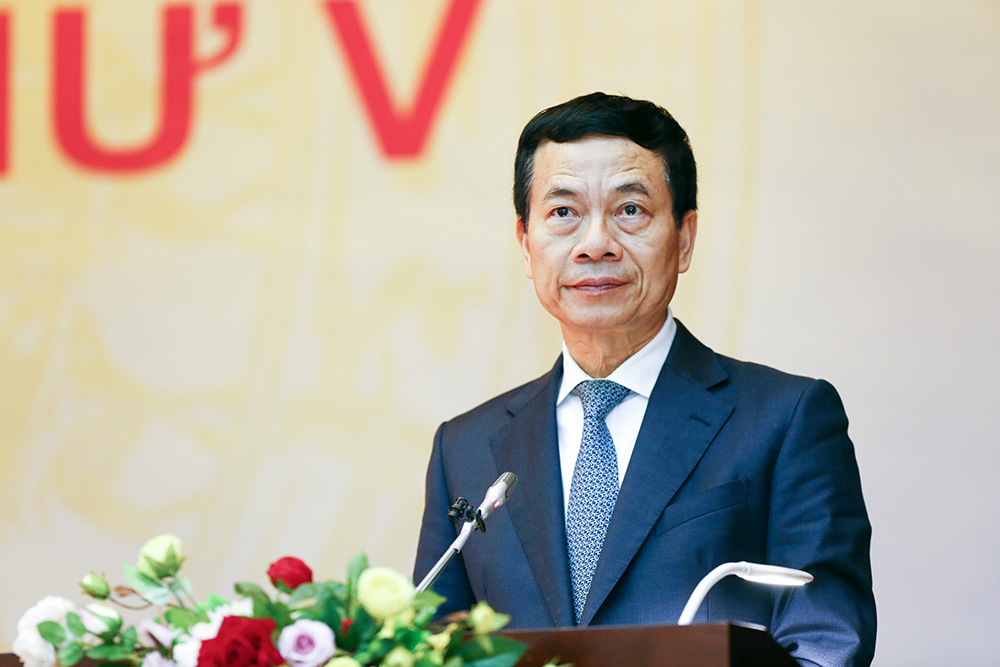
The Ministry of Information and Communications (MIC) introduced eight core programs for the 2020-2025 period and reviewed results achieved by the information and communications (ICT) sector in the past five years at the 5th Congress of the Ministry’s Party Committee held in Hanoi on August 18.
During the 2015-2020 period, the Ministry has achieved and exceeded the goals and tasks set out by the Resolution of the 4th Party Congress.
Last year, the total revenue of the whole industry is estimated at nearly $135 billion, an increase of 2.5 times compared to 2015. The sector contributed over $4.3 billion, 1.6 times more than that of 2015, to the State budget.
Some large ICT firms of Vietnam have been known internationally. In the International Telecommunications Union’s (ITU) global cybersecurity index rankings, Vietnam’s position rose sharply from 100 in 2017 to 50 in 2019.
New missions
“The ICT industry can create a pair of wings for the country to fly. One wing is digital technology and the other is communication," Minister Hung said.
He said a country that wants to develop and make a breakthrough needs spiritual strength. Development must rely on technology. Digital technology and digital infrastructure play a decisive role in the digital economy, contributing to making Vietnam a prosperous country in 2045, when Vietnam is 100 years old.
The Minister mentioned the eight core programs for the new development period.
First, transforming postage from newsletter delivery into the infrastructure of the physical flow of the digital economy. Building postal infrastructure to ensure the physical flow of the digital economy in addition to the data flow.
Second, transform telecommunications infrastructure into infrastructure of the digital economy; deploy 5G, one smartphone per person, and one fiber-optic internet line for each household; Cloud infrastructure, digital identity platform, technology provision platforms such as: AI, IoT, big data, blockchain, digital transformation platform for industries, etc.
Third, turn Vietnam into a cybersecurity powerhouse, with a focus on mastering the ecosystem of cybersecurity products, to ensure Vietnam's prosperity in cyberspace; ensure cyber sovereignty. Vietnamese cyberspace is a new living environment, so it must be clean and healthy.
Fourth, transform from e-government to digital government; all Government activities to be performed on a digital environment; create many useful services for the people; more interaction between the people with the government.
Fifth, transform from outsourcing to product development. The program “Make in Vietnam”, with the focus on research and manufacture of 5G, IoT equipment, platforms for national digital transformation. Instead of processing and assembling, Vietnamese businesses will focus on making products.
Sixth, develop digital technology enterprises, from 50,000 to 100,000 businesses, including those that own core technologies, both product development firms and innovative startups.
Seventh, the media must protect the national sovereignty of information, reflect honestly the main flow of Vietnamese society, create social consensus, social trust, spread positive energy, contribute to creating stability for national development, arousing aspirations for a strong and prosperous Vietnam, contributing to creating spiritual strength for Vietnam to thrive.
Eighth, transmit from IT applications to digital transformation; lead and promote national digital transformation. Digital transformation is a revolution of the whole nation, the whole people. Digital transformation must go hand in hand with the protection of digital sovereignty.
Minister Hung emphasized that these eight programs are the new new mission of the ICT industry to the country.


